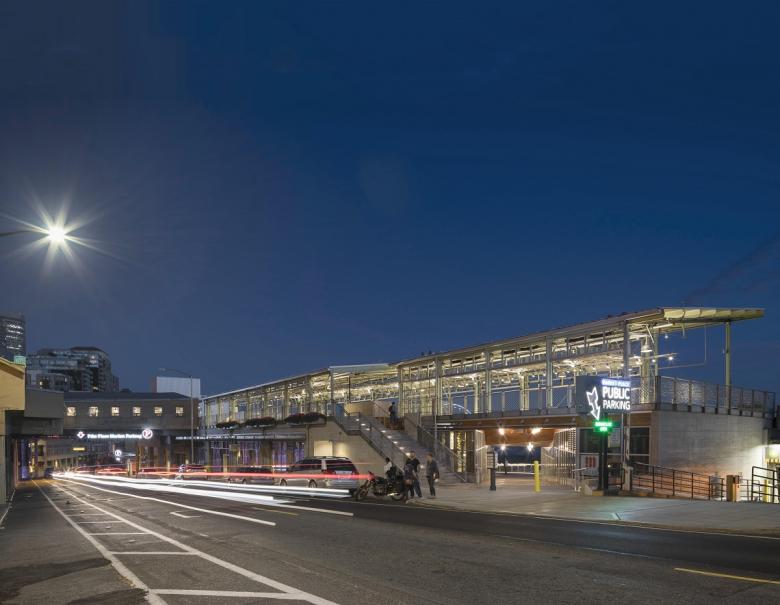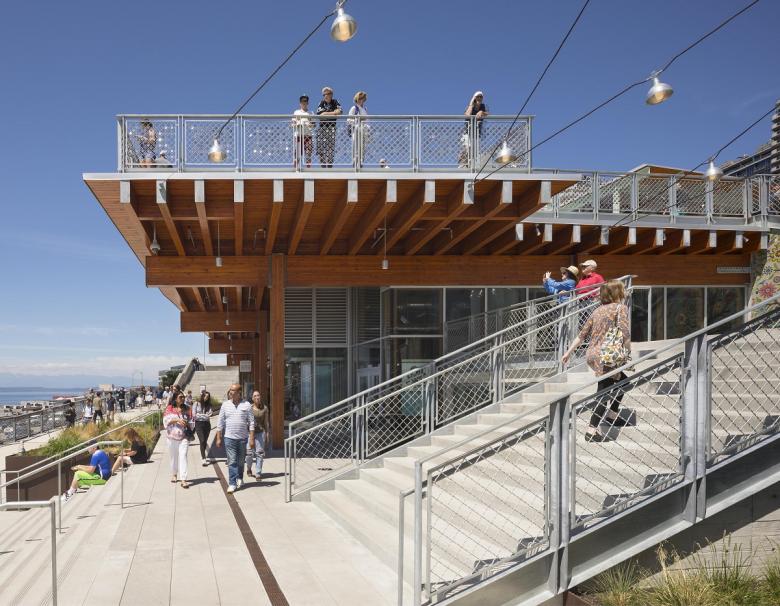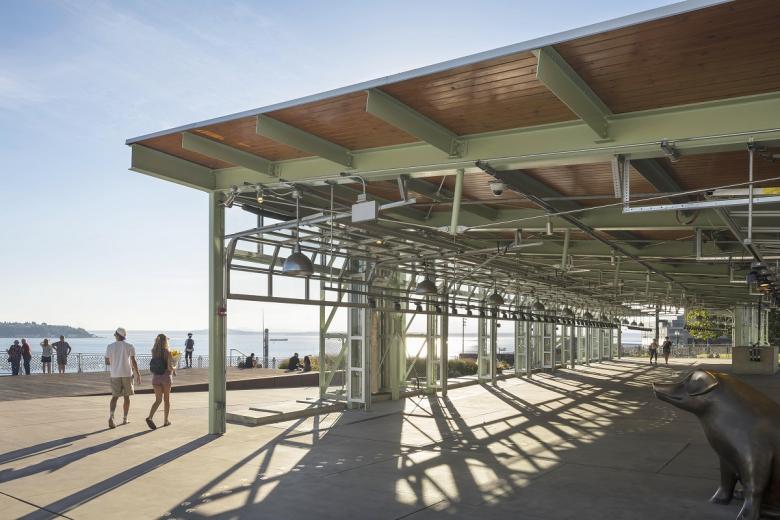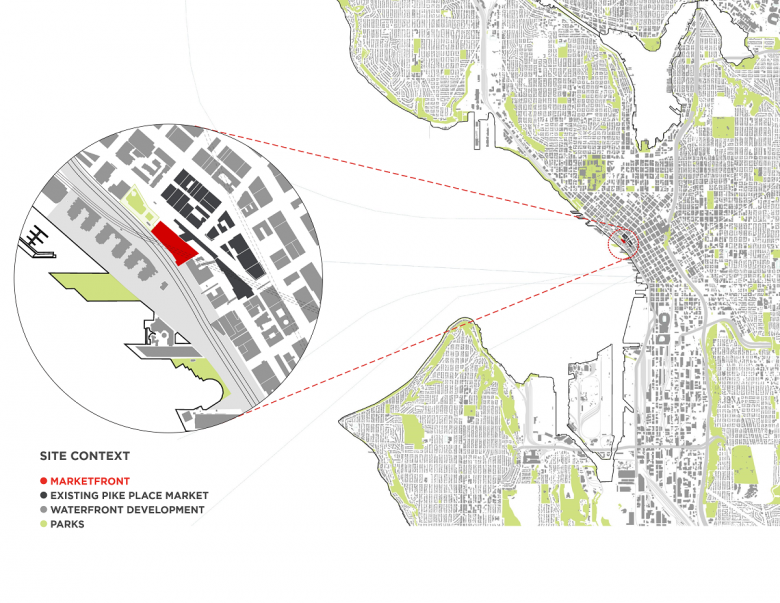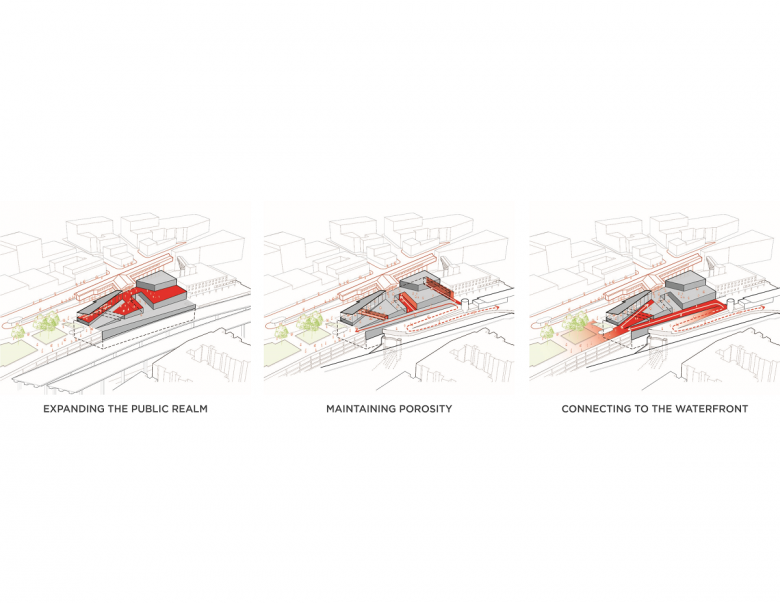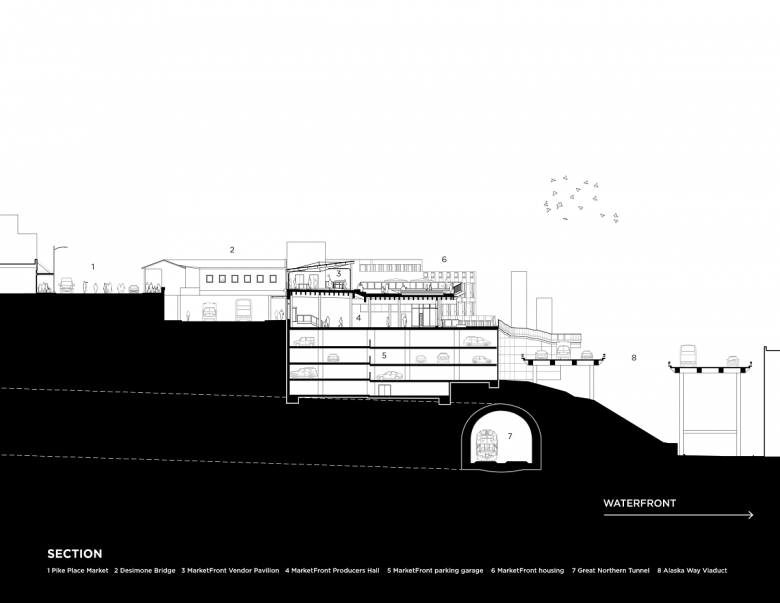The Miller Hull Partnership
Pike Place MarketFront
The Miller Hull Partnership
27. augustus 2018
Photo: Lara Swimmer
Along with the Space Needle, Pike Place Market is one of the must-see attractions for first-time visitors to Seattle, Washington. Famous for its fish slingers and being one of the longest continuously operating markets in the United States, Pike Place Market expanded recently with MarketFront. Designed by The Miller Hull Partnership, Pike Place MarketFront consists of a dynamic mix of public space, stalls for farmers and artists, commercial space, a neighborhood center, parking, public art, and even senior housing. The architects answered a few questions about MarketFront, whose completion last year coincided with Pike Place Market's 110th anniversary.
Project: Pike Place MarketFront, 2017
Location: Seattle, Washington, USA
Client: Pike Place Market Preservation and Development Authority
Architect: The Miller Hull Partnership, LLP
Design Lead: Brian Court
Partner-in-Charge: Sian Roberts
Project Manager: Steve Doub
Project Team: David Miller, Becky Roberts, Casey Riske, Catharine Killien, Chi Krneta, Chuck Weldy, Cory Mattheis, David Cinamon, Eugene Lau, Grace Leong, Janet Bean, Kandis Larsen, Kristen Dotson, Peipei Sun, Rohit Eustace, Ryan Heltzel-Drake, Ryan Rideout, Sean Morrissey, Sean Waldron, Stephen Triguerio, Tetsuo Takemoto, Wojtek Szczerba, Zubin Rao
Structural Engineer: Magnusson Klemencic Associates (MKA)
MEP/FP Engineer: ARUP
Landscape Architect: Berger Partnership
Lighting Designer: dark | light design
Contractor: Sellen (GCCM); see bottom for a list of other contractors
Site Area: 40,502 sf
Building Area: 210,000 sf
Photographs: Lara Swimmer Photography
Photo: Lara Swimmer
Please provide an overview of the project.
Since its opening at the turn of the 20th century, Pike Place Market has become a pillar of Seattle’s urban fabric. More than just a public market, this neighborhood-turned-historic district is home to farmers, craftspeople, small businesses and residents, each an integral part of the area’s history and character.
In 2011, the Pike Place Market Preservation and Development Authority (PDA) was given an opportunity to reclaim the site of a former Municipal Market Building that was demolished after a fire damaged the building in 1974. After a competitive process, PDA and the City of Seattle selected a team to design a new community space that complements the culture and spirit of the original Market, the second addition to Pike Place Market in nearly 40 years.
Completed in 2017, Pike Place MarketFront caters to the present, but looks to the future, acting as the gateway from the heart of downtown to the waterfront. Today, the project serves as a critical connection point where the most essential goods and services are available within a ten-minute walk and well-served by transit. In the near future, Pike Place MarketFront will also lead down to Overlook Walk, a part of Seattle’s multi-phase waterfront revitalization plan that is currently in design.
Photo: Lara Swimmer
What are the main ideas and inspirations influencing the design of the building?
Early in the process, the Pike Place MarketFront design team established a set of goals to create a unique urban experience in Seattle’s Pike Place Market District. With the urban design framework for the waterfront in place, the MarketFront project was challenged to develop a rich range of pathways and experiences that engage the public in the immediate local environment, while ultimately linking to the future shoreline promenade on the waterfront.
The design team’s vision was to open the city’s treasured landmark with grand public gathering space framed by a contemporary lightness and transparency. The team found contextual inspiration in the character of Pike Place Market’s simple utilitarian character, as well as in the concrete post and beam structures and heavy timber elements commonly found throughout the existing Market. An extension of the neighborhood, Pike Place MarketFront is inspired by the existing district, adding 50 vendor stalls, 40 low-income and senior apartments, commercial, retail and office space, public restrooms and 300 underground parking spaces.
Drawing: The Miller Hull Partnership
How does the design respond to the unique qualities of the site?
Like the existing Pike Place Market, Pike Place MarketFront is an active public space built for the community. Between 20,000 and 40,000 people visit the Market each day from all over the world. The highly compact, complete urban neighborhood of the Market exhibits the informal, diverse and vital compactness of true urbanism — buildings of varying age are humanly scaled, its streets are dominated by pedestrians, not cars, regional and local fish, fruits and produce are abundant and small owner-operated businesses are the rule, not the exception.
Drawing: The Miller Hull Partnership
How did the project change between the initial design stage and the completion of the building?
Pike Place MarketFront’s programmatic complexity and prominence within the Seattle community demanded deep involvement from a wide range of stakeholders, including the Market’s day-stall merchants and the PDA Council, whose vision is to rejuvenate the economic base toward stronger financial viability. Over two years, the design team participated in hundreds of public meetings, seeking comment on design direction and development. This interactive process and strong engagement of the Market’s community led to the creation of a high integrated “new urban place” that excites the long-standing residents, as well as the new visitors.
Drawing: The Miller Hull Partnership
Was the project influenced by any trends in energy-conservation, construction, or design?
Pike Place MarketFront has a strong Pacific Northwest toughness, employing cast-in-place concrete in combination with engineered timber for the project’s base, capped by an open-air structural steel framed pavilion. Railings, canopies and lighting fixtures are in galvanized steel. Large expanses of glazing utilize aluminum curtain wall with glue-laminated mullions to resist heavy wind loads and underscore the industrial feel.
Email interview conducted by John Hill.
Other Contractors:
Malcolm Drilling Company (Piling)
Condon Johnson (Shoring)
Gary Merlino Construction (Utilities)
Cochran (Electrical)
Auburn Mechanical (Mechanical and Plumbing)
T Yorozu (Landscape)
Snyder (Roofing/Waterproofing)
Northshore Exteriors (Metal Roofing & Wall Panels)
Eastside Glass (Glazing)
Patriot Fire Protection (Fire Protection)
Olympian Precast (Precast)
